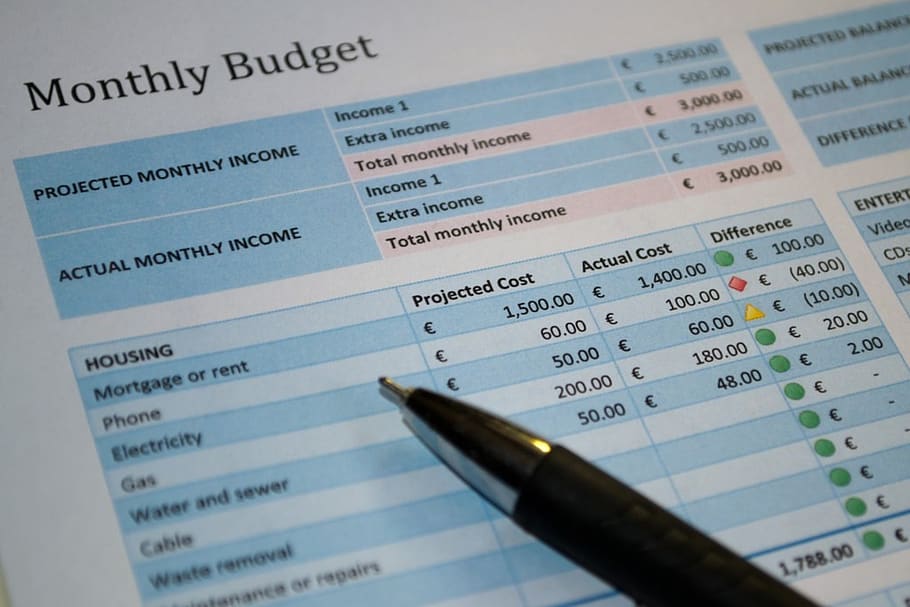Following a budget is a step-by-step process that can seem daunting at times. Understanding the smartest ways to save, invest, and spend can take time and practice. Budgeting allows you to track your spending to ensure you have enough money for the necessities and to just enjoy life. If you’re struggling with any debt, budgeting is crucial to getting into the black and creating the best financial situation possible.
Whether you’re in the early stages of saving or you’re ready to start thinking long-term, understanding the benefits of organizing your finances by week, month, and year will help you make the smartest decisions with your money.
Organizing Weekly

source:pxfuel.com
Thinking about your yearly budget can feel overwhelming, so it may be best to break it down and focus on your immediate plans. By addressing your weekly budget, you can begin to notice and manage your weekly spending and saving habits in order to make the best decisions for your future.
Stay away from credit cards and work off a cash-only budget wherever possible. This method can help you stay on track as it will allow you to pinpoint where you tend to indulge. Ask yourself if you’re spending too much money where it isn’t necessary, such as restaurants and online shopping.
Overspending on small items can lead to big losses down the road. Weekly splurges can end up costing you thousands of dollars at the end of the year. Focusing on this short-term strategy can help steer you away from overspending too early in the month.
Working off of a weekly budget can also help eliminate any debt. A Duke University Study found that smaller and more frequent debt payments could lead to borrowers repaying more money than a single monthly lump sum. Through efficient cost-cutting in addition to your payments, you’ll be able to eliminate your debts faster than if you weren’t budgeting your money.
If you’re unsure where to begin, there are different ways to get started. Consider using an online weekly budget planner to help organize your spending. Holding yourself accountable is key to sustaining your budget. Each week, consider writing down a list of your short-term goals and compare your progress week-to-week. If you’re not meeting your goals as projected, you can make simple adjustments because you’re dealing with a realistic timeline. You’ll see continuous improvement if you manage your financial goals.
You may find yourself in need of some short-term assistance if you are facing an irregular cash shortage. If this occurs, there are payday loan options available such as those provided by Goday.ca that offer simple, convenient borrowing solutions. Unlike traditional bank loans, the right lender should be able to remove the common red tape; customers will often only need to provide their employment history and banking information to qualify.
Managing Monthly

source:pxfuel.com
Finding the budgeting method that works best for you may take some time, but there are a few simple steps to help you get started. You may choose to work off a budget sheet, either manually or using an online tool; there are a number of apps available to help streamline the process. Whichever method you choose, you can be confident in knowing you’re making the smartest financial decisions for your future.
Firstly, you’ll want to gather all of your monthly statements. This includes bank and credit card statements, investment accounts, and your paychecks. By examining at least three months of statements, you’ll have a strong idea where your budget currently stands.
Your take-home income matters the most when it comes to your monthly budget. This is what you’re saving or spending after all taxes have been paid. There are a number of resources available online to help calculate if you’re unsure how much you’re taking home. Once you’re organized you can then look at your expenses, from mortgage or rent payments to groceries, prescriptions, student loans etc. It’s recommended that you divide these into categories to simplify the process. You’ll want to ensure you’re calculating your fixed and variable expenses, also known as your needs and wants.
Month by month you’ll start to notice if your spending habits are changing and you can continue to make adjustments to your monthly budget if needed. From there, it’s time to look further ahead and understand why yearly budgets are important.
Forecasting Yearly

source:pxfuel.com
Creating a yearly budget can be helpful in uncovering omitted expenses that can impact your weekly or monthly income. Factors such as home or auto repairs, yearly tax payments, and even major holidays or birthdays can affect your finances. Creating a yearly budget may take more time and effort than your weekly or monthly lists, but it will benefit you in the long run.
Keep a list of all your irregular expenses over the last year or so to determine if your largest expenditures are recurring or not. Secondly, creating an emergency fund is crucial to thinking about your long-term finances. Predicting and preparing for these instances will help you stay ahead and prevent you from going into debt should you need to repair your car or pay off rising utility costs.
Budgeting for recreational activities is also important. If you’re strategic with your budget early on, you should be able to set aside money for entertainment purposes. Having the necessary funds for your future vacation, holidays, birthdays, and other special occasions ensures you don’t miss out because of your finances.
If you find yourself with a budget that is higher than the income you’re bringing in, you will need to look at where you can cut costs; this will most likely need to come from your variable expenses so as to not hinder your fixed expenses. Cooking at home, shopping second hand, and walking rather than driving whenever possible are just a few easy ways to save. If you have excess funds, it’s important to avoid the temptation to spend frivolously. Consider investing with your bank or through stocks if you’re experienced or simply adding to your emergency fund — it will keep you ahead of the financial game.

